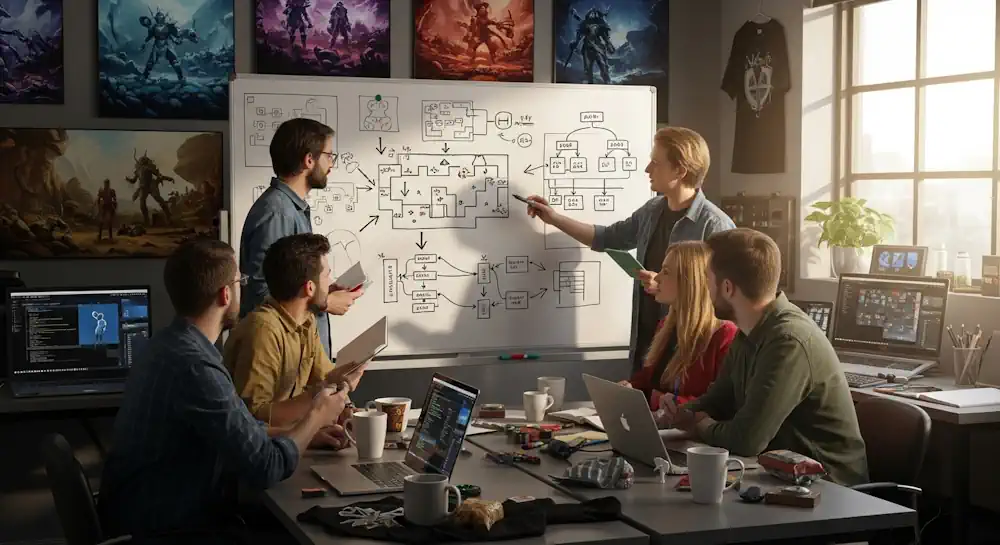Artificial intelligence is rapidly reshaping how games are built, from automating code to optimizing design. A new wave of AI copilots is helping developers handle repetitive technical work, opening the door for faster iteration, smaller teams, and even creators with little to no programming experience.

Recent surveys and product launches show that AI has become more than an experimental tool: it is now a mainstream part of game development pipelines worldwide.
Growing Reliance on AI Tools
A Google Cloud study released in August 2025 found that nearly nine out of ten game developers now use AI agents or copilots in their work. The majority employ these systems for asset generation, bug detection, code completion, and live-ops analytics. Developers report that these assistants significantly reduce time spent on debugging and prototyping, freeing human teams to focus on creative storytelling and gameplay design.
Industry analysts note that this surge reflects a broader shift toward software-assisted development across technology sectors. While coding copilots have become standard in enterprise software engineering, the interactive nature of games makes their integration both complex and transformative.
Google’s report indicates that studios using AI tools experienced shorter production cycles and fewer post-release defects, though they also cited challenges in data privacy and maintaining creative control over automated outputs.
Coplay and the Rise of AI-Driven Game Engines
One of the most visible entrants in this new space is Coplay, a startup that launched its open beta for Unity developers earlier this year. The platform allows creators to describe gameplay logic and interactions in natural language, which its AI models then translate into functioning scripts and scene configurations.
Coplay’s leadership argues that this approach will democratize game creation, lowering barriers for newcomers who lack formal programming training. Early beta testers have used it to build small prototypes within hours instead of days, suggesting that such systems could dramatically reduce development costs for indie teams.
Other companies, including Inworld AI and Scenario, are expanding similar offerings that generate narrative dialogue, 3D environments, or non-player character behaviors dynamically. Together, these tools are helping developers build larger, more reactive worlds with smaller teams.

Japanese Studios Embrace Automation
The trend is also evident across Asia, particularly in Japan’s gaming sector. A 2025 industry survey found that more than half of Japanese studios now integrate AI in some form. Leading developers like Capcom and Level-5 are using AI to upscale visual assets, refine animation pipelines, and even assist in code generation for gameplay systems.
Analysts note that Japanese companies have traditionally been cautious about adopting disruptive technology, but competitive pressure and rising production costs have accelerated their shift. AI now helps these studios localize titles faster and adapt their iconic franchises for modern hardware while maintaining artistic quality.
Opportunities and Cautions Ahead
Despite its advantages, AI-assisted programming raises new ethical and creative concerns. Developers have expressed unease about potential overreliance on generated code and the risk of homogenized design. Some industry leaders warn that treating AI as a replacement for creative labor rather than a supplement could lead to generic or emotionally flat experiences.
Embracer Group’s CEO recently noted that automation must enhance rather than diminish the artistry that makes games unique. Many studios are now drafting internal policies to ensure human oversight remains central to the creative process.
There are also technical hurdles. AI copilots trained on public code repositories may inherit bugs or incompatible patterns, requiring careful review by human engineers. Security teams stress that developers must validate any AI-generated code before deployment, particularly in live-service games that handle user data.
The Future of AI-Assisted Game Development
Looking forward, experts expect AI copilots to become deeply embedded in standard development environments. Game engines like Unity and Unreal are experimenting with built-in generative tools, while open-source projects aim to standardize APIs for model integration.
Industry observers predict that within five years, AI systems could handle entire stages of production, such as environment generation, gameplay balancing, and testing, under human direction. This could lead to smaller, more agile studios capable of producing high-quality titles without the massive budgets currently required for AAA releases.
For independent creators, the technology could mean unprecedented freedom to experiment. For large publishers, it promises efficiency but demands careful governance to protect creativity and originality. As the line between coder and designer blurs, the next era of game programming may belong as much to the storyteller as to the engineer.


